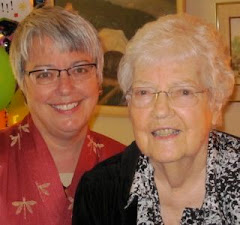I asked Mom if she'd like to go out to lunch. I'd been away from her a bit, between a long weekend and a medical procedure, though we've talked daily. But she's been feeling a bit neglected, so I wanted our visit today to be a bit special.
We went to one of her favorites, Olive Garden. As I looked around, I was struck by the way our clothes and our companions brand us. I saw tables of apparent co-workers, dressed well, or at least 'business casual', talking intensely. I imagined their conversation ... about interest rates, or project deadlines, or complaining about the boss or the long work days.
I, however, was with the 90-year-old, who came in shuffling extremely slowly with her walker. We had little to say, because we'd already exhausted our usual topics. Instead of a nice knit with a silk jacket and perfect jewelry as I'd worn before, today I wore my shlumpy work-around-the-house, worn-at-the-collar grey velour outfit.
For a moment, I was jealous. I felt ... unimportant. I remembered the days when I went to lunch with co-workers, when we filled our table with laughter or urgent discussion or complaints about all the stress. When I looked good and was valued by my company, my boss, my peers, my clients. I was an expert. I was respected. I influenced senior decision-makers. As I look back, it seems that I used to be important, in my profession.
A few years ago, I chose a voluntary layoff from this Fortune 50 company. I wanted to do more in community service, and supporting my mother and my grandchildren. I honestly am SO very very glad, then and now. Though my work now does not have the value placed on it by salary or corporate world, I remind myself that I touch the lives of humans. I bring meaning to real people. I make a difference in a way that my Senior Program Manager job never did. Never could.
And just maybe just a couple of them looked at a relaxed woman lunching with her aged mother, sitting in a comfortable outfit, and were just a little jealous.
Monday, May 16, 2011
Sunday, May 15, 2011
A terrible honor
Among my siblings, I support my mother here, my sister supports her father-in-law who lives in a nursing home a couple hours from her house in Iowa, and my brother brought his father-in-law in his home some months ago. We each have our responsibilities to our senior generation, to one degree or another.
I received an email from my brother, comparing his father-in-law, 'Ted', to my mother. It was a lengthy email, more than I'd heard from him in some time, comparing functionality point-by-point. Ted is much worse than my mother, and my brother and his wife do a great deal of the very-hands-on personal care. Ted has difficulty (or complete inability) with all of the ADL's (Activities of Daily Living: continence, toileting, transferring, ambulation, dressing and personal care, feeding oneself). My brother says that if Ted was in a nursing home, he would die, period.
It was a "you are so lucky" email.
And, yes, that level of care is not something that I am doing with my mother. She can use a walker (though slowly with difficulty and frequent rest stops). She can transfer with difficulty, very slowly getting out of her chair or bed and getting to her walker. Both the continence and toileting part, she requires complete assistance from the aides at the assisted living home where she lives.
So, yes, I do have an easier time than he does, though I have been visiting her almost daily for three and a half years, and suspect I'll do it for a couple more. I would guess that his father-in-law will not survive as long. His effort is much more intense but will be briefer; my effort is less difficult but much longer.
My sister is a school teacher, and then spends entire weekends driving to and from visit her father-in-law, grading papers. Then she has to go back to work on Monday. Other weekends she comes here to Kansas City area to visit our mother.
And, amid all this sacrifice, family issues from decades ago arise. The competitions. The roles and labels we received then. Old irritations.
Each of us carries our load, our duty, our responsibility, to the previous generation.
I told my brother that I view this as a 'terrible honor', to support someone as they approach death. When elders are feeling vulnerable and helpless, when they can't control their bladder or bowels and feel shame, when they know they have just a short time left ... or, if dementia has robbed them of awareness, they may not even be aware of their fleeting future. The responsibility can be terrible and overwhelming, but there is a great honor in being that person's sponsor, protector, facilitator, and friend/family at such a vulnerable time.
Subscribe to:
Posts (Atom)



